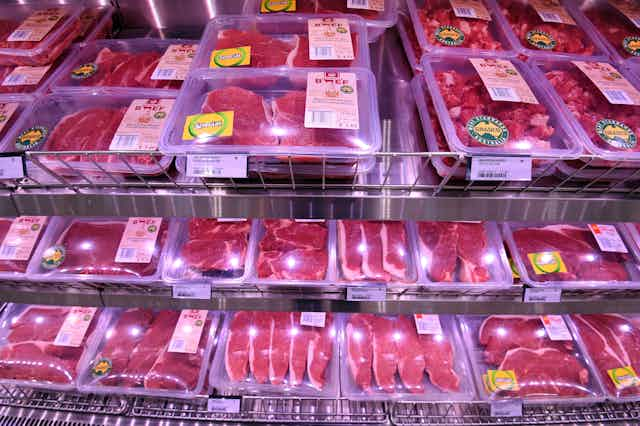Reform of Australia’s Goods and Services Tax (GST) is firmly back on the political agenda. There has been plenty of focus on whether the tax rate should be lifted, but less on whether it could be made more sophisticated in its social effects as well as its economic ones. Here is one suggestion: adding GST to meat.
Food has a special tax-exempt status in several countries around the world, including Australia, where it is not included in the GST. Most American jurisdictions exclude groceries from sales tax and there is zero value-added tax (VAT) on foodstuffs in Ireland, Malta and United Kingdom, although many other European countries apply VAT to food.
However, regardless of the level of tax charged on food, taxation systems universally fail to distinguish between different types of food (except sometimes in the case of infant foods). Simply put, taxes are blind to the differences between meat and other foods like fruit and vegetables.
This ignores the fact that not all food is created and consumed equally. If we accept that taxes, as well as collect revenue, should also encourage or discourage certain behaviours, then we should question why meat is taxed (or exempted) at the same rate as fruit and veg.
Meat production and consumption impose unduly high environmental and health burdens on society. Compared with plant-based options, meat has higher greenhouse gas emissions per unit of nutritional value, as well as excessively high water and land impacts. Current Australian dietary guidelines advocate limiting red meat intake because of clear scientific evidence connected to cancer risks.
Tax revenue is used (among other things) to support public health care and to fund government-backed environmental initiatives. So given that meat compromises both public health and the environment, it surely follows that it should be taxed accordingly.
Meaty issue
State premiers who support raising the GST from 10% to 15% and extending it to cover fresh food should consider the potential revenues purely from meat. We calculate that putting GST on meat (at either 10% or 15%) would generate between A$3 billion and A$4 billion in extra income for the federal coffers.
Internationally, calls are increasing for taxing meat on environmental grounds, for instance in the Netherlands. A reduction in meat consumption encouraged through taxation will have both environmental and public health benefits.
Fruit and vegetables are key components of a healthy, balanced diet, yet Australians are consuming far less than the healthy guidelines, while eating twice as much meat as the [recommended healthy intake](Australians currently consume almost twice the amount of red meat recommended in dietary guidelines (https://www.nhmrc.gov.au/_files_nhmrc/publications/attachments/n55_australian_dietary_guidelines_130530.pdf). Taxing meat could help nudge Australians in the healthier direction espoused by existing approaches such as flexitarianism.
In contrast, equal taxes on all types of fresh food would maintain the current imbalance of unhealthy overconsumption of meat and underconsumption of fruit and vegetables. From a public health perspective, fruit and vegetables should not be taxed, particularly if those tax revenues are destined for the public health sector – eating vegetables already reduces healthcare costs!
Meat, on the other hand, is a prime candidate for taxation because of its negative impacts. By not taxing meat production and consumption appropriately, governments are in fact subsidising environmental and public health destruction – and meat tax could perhaps be one option on the table for this year’s Paris climate negotiations.
Taxing meat needs to be included on the political agenda as a means for funding climate change mitigation, addressing climate-related health consequences, and supporting agricultural innovation more appropriate for an era of climate change.
Given the positive public health and environmental benefits of taxing meat, not doing so would not only be a lost fiscal opportunity, but we would also be letting down our health and the environment.

